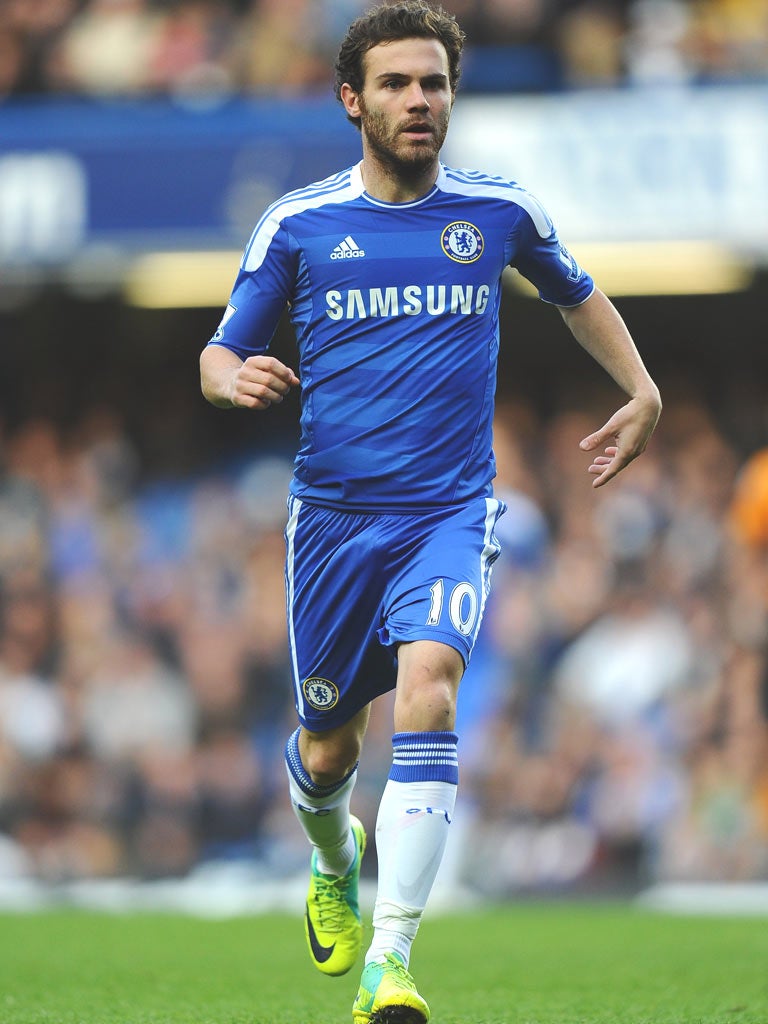
Your support helps us to tell the story
From reproductive rights to climate change to Big Tech, The Independent is on the ground when the story is developing. Whether it's investigating the financials of Elon Musk's pro-Trump PAC or producing our latest documentary, 'The A Word', which shines a light on the American women fighting for reproductive rights, we know how important it is to parse out the facts from the messaging.
At such a critical moment in US history, we need reporters on the ground. Your donation allows us to keep sending journalists to speak to both sides of the story.
The Independent is trusted by Americans across the entire political spectrum. And unlike many other quality news outlets, we choose not to lock Americans out of our reporting and analysis with paywalls. We believe quality journalism should be available to everyone, paid for by those who can afford it.
Your support makes all the difference.Juan Mata pauses for thought. It is not often that Chelsea's creator-in-chief stops. His movement, on the pitch, is constant, buzzing, whirring. Even in his quiet, softly-spoken English, he is fluent, engaging. But one question has stumped him. "Who is shorter, me or David Silva?" he asks himself, rhetorically. "I don't know. Probably him. Just."
More than their flawless technique, their prophetic vision or their spectral ability to locate space, it is size which once threatened to dominate the careers of both Mata and Silva. At Valencia, the club where both made their name and where they forged a firm friendship, they were known as two of Los Bajitos, the little people, along with the equally diminutive Pablo Hernandez and David Villa.
At least at the Mestalla their size did not count against them. At Real Madrid it had. Mata, at 23 the younger of the pair by two years, was continually overlooked by the club's senior teams despite excelling in their academy sides because of his lack of stature, his lack of power. He cites as his heroes the likes of Romario, "because without being tall or strong he always got 30 goals a season," and Pablo Aimar, the Benfica playmaker, but, as his career stalled at the Bernabeu, it looked as though he would not be able to follow in their path.
Compared to Silva, though, Mata was a success in the Spanish capital. The Manchester City midfielder, now widely heralded as the best player in the Premier League and seen as the creative hub for his country, the reigning world and European champions, had not even reached as far as the youth sides. He joined Valencia as a 14-year-old because Real believed he simply was not big enough to make it.
Silva attributes his ability to overcome those doubts to Valencia's decision to loan him out to a succession of sides in Spain's more prosaic footballing areas – Celta Vigo in Galicia and, notably, the Basque side Eibar, where he recalls the defenders being "like oaks" – but still, the worries persisted. A number of English clubs decided against attempting to coax the playmaker from Valencia because they feared he would be bullied in the pitched battles of the Premier League, while Mata was said by one manager to lack "the bottle" to succeed here.
Such concerns seem foolish now. Few players in its brief history have adapted so quickly to the Premier League. Indeed, there is an argument that the reverse is true: it is not so much that the two Spain internationals have adjusted to English football, but rather that English football has adjusted to them. Tonight, when City visit Stamford Bridge, victory will not be determined by typical, English blood-and-thunder, but by which Spanish silk masks the most steel.
"We have a different style of football," says Mata. "We are allowed to play like we are in Spain, with more possession, more passes, more assists. Here everything is normally different to that. We are strange here. But it is good for the Premier League, to have different styles of football. A lot of Spanish players have come here in the last few years, so I don't know if the league has changed [because of Mata and Silva]."
Such modesty is typical of Mata. The son of a lower-league player in Spain, the 23-year-old is not cast in the model of many of his peers. Time, though, precludes him from having exerted the same sort of effect as his old friend. Mata spoke to Silva before deciding on a move to Chelsea, and acknowledges that the answers he received were crucial in tempting him to leave Spain. "He told me he was very happy here, in Manchester, and with the culture of English football," said the midfielder.
It shows. Silva's performances this season have been central in allowing Roberto Mancini's side to seize control of the division; so impressive have been their opening salvos in the campaign that Villas-Boas believes victory in west London tonight would not only all but end Chelsea's challenge, but put City in an almost unassailable position at the top of the division.
Despite that, though, Mata is not fazed. "You have to plan for a good game with them and to try to cause them problems. So no, we do not have any fear for City, especially because we are playing at home."
Join our commenting forum
Join thought-provoking conversations, follow other Independent readers and see their replies
Comments